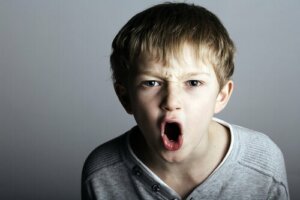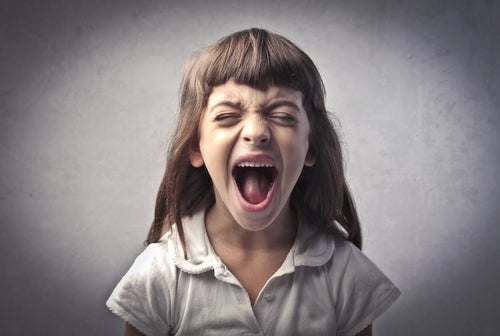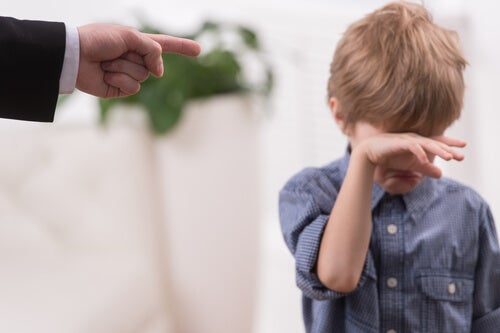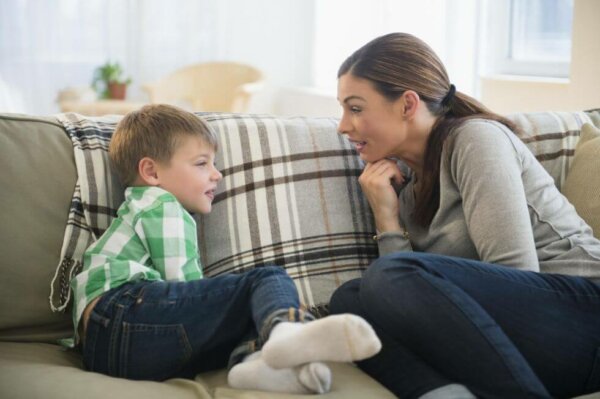Characteristics of Aggressive Behavior in Children


Written and verified by the psychologist Gema Sánchez Cuevas
Aggressive behavior in children and other behavioral disturbances constitute the most frequent problem in child and adolescent mental health consultations. This is particularly significant in boys and affects between 35 to 50 out of every 100 of them.
Without going any further, there’s the case of a young man who stabbed his mother because the Internet wasn’t working. This is a particularly serious case of aggression due to its consequences. Milder cases are more common but not necessarily less worrying.
In this regard, it’s inevitable to wonder whether social concern responds to a real increase in the frequency and seriousness of antisocial behavior. One can find a reflection of this seriousness in aggressive behavior within a family context.
It’s surprising how early aggressive behavior appears in children due to the lack of parental tools to redirect it. Parents report not being able to control their four and five-year-old children when they verbally and physically assault them.
The explanation for aggressive behavior in children is complex. One can’t seek it only in specific cause-effect relationships or individual or family factors and must consider a broader framework. It includes macro-social variables, the basis of most prevention programs. Indeed, this analysis isn’t simple. There have been social changes in recent decades. These refer to values and beliefs about educational styles. In other words, changes that may have contributed to causing the problem.
What exactly is child aggressiveness?

The word aggressiveness derives from the Latin “agredi,” which means “to attack”. Attacking or assaulting implies that someone is determined to impose their will on another person or object, threatening to cause physical or psychological harm. In the case of children, aggression is usually direct, a violent act against a person. It can be physical and involve kicking, pushing, shoving, pinching, etc.
An act of violence can also be verbal and manifest as insults, swearing, and threats. Another form of aggression is one in which the child lashes out at objects that belong to those who oppose their wishes.
The development of aggression in children
Aggressive behavior and antisocial behavior are somewhat overlapping but they’re different entities. However, when aggressive behavior in children is fairly stable, one can predict future antisocial behavior in adolescence.
Multiple factors influence behavior, including the genes. Researchers think there’s a link between serotonin levels and aggressive behavior. They’ve also found interactions between parental neglect and monoamine oxidase (MAO-A) levels.
Other aspects influence aggressiveness in children in addition to genetic determinants. These refer, for example, to parents who try to impose a particularly strong discipline, recurrently using violence. Abuse of young people and children often leads to aggression and antisocial behavior. Note that not all abused children victimize others as they grow up.
There are also other factors associated with aggression such as the mother’s age, the family’s capacity for social adjustment, attention deficit, temperament, the type of relationship between parents and children, lack of family cohesion, and inconsistency in discipline and repression, among others.
The importance of family in children’s aggressive behavior

The family is the context that has the greatest influence on a child. Thus, the interactions between parents and children shape aggressive behavior, especially regarding the management of the consequences derived from such behavior. The problem with this is that the child may generalize what they learned about the usefulness of aggression. They may somehow think that the fact that their parents use it validates it as an instrument to get what they want, even with those they love.
The type of discipline exercised by parents on their children is also important. Aggressive behavior in children is especially promoted by a combination of relaxed and undemanding discipline with hostile attitudes on the part of parents.
Those who always do what the child wants, and comply with their demands, seemingly give the child a great margin of freedom. However, their reaction is disproportionate when the child does something that displeases them. This lack of coherence ends up settling somehow in the child, who, disoriented, tends to imitate the disproportionate behavior of the parents when they dislike something.
Inconsistency in parental behavior influences aggressive behavior in children
This inconsistency occurs when parents disapprove of aggression and then use it to punish a child. Parents who stop aggression by means other than punishment are less likely to encourage aggressive actions in their offspring.
This incongruence can also occur when parents punish the child for hitting another only to ignore it and not punish the child at other times. As you can see, they aren’t giving consistent guidelines.
Treatment of aggressive behavior in children

The treatment of aggressive behavior in children isn’t only based on reducing or eliminating such behavior. They must also establish and encourage alternative behaviors.
One can use several procedures for this purpose to control the antecedents of aggressive behavior, the modeling of non-aggressive behavior, the reduction of aversive stimulation, and the control of consequences.
In addition, the parenting school (teaching parents the characteristics of children or the techniques with which to modify their children’s behavior, for example) is a fundamental element within a program that seeks to eliminate aggressive behavior.
As you can see, aggressive behavior is a worrying fact that’s on the rise. The role of the family, especially the parents, is crucial in addressing these behaviors. A specialized psychologist can be of great help to families with this problem.
Aggressive behavior in children and other behavioral disturbances constitute the most frequent problem in child and adolescent mental health consultations. This is particularly significant in boys and affects between 35 to 50 out of every 100 of them.
Without going any further, there’s the case of a young man who stabbed his mother because the Internet wasn’t working. This is a particularly serious case of aggression due to its consequences. Milder cases are more common but not necessarily less worrying.
In this regard, it’s inevitable to wonder whether social concern responds to a real increase in the frequency and seriousness of antisocial behavior. One can find a reflection of this seriousness in aggressive behavior within a family context.
It’s surprising how early aggressive behavior appears in children due to the lack of parental tools to redirect it. Parents report not being able to control their four and five-year-old children when they verbally and physically assault them.
The explanation for aggressive behavior in children is complex. One can’t seek it only in specific cause-effect relationships or individual or family factors and must consider a broader framework. It includes macro-social variables, the basis of most prevention programs. Indeed, this analysis isn’t simple. There have been social changes in recent decades. These refer to values and beliefs about educational styles. In other words, changes that may have contributed to causing the problem.
What exactly is child aggressiveness?

The word aggressiveness derives from the Latin “agredi,” which means “to attack”. Attacking or assaulting implies that someone is determined to impose their will on another person or object, threatening to cause physical or psychological harm. In the case of children, aggression is usually direct, a violent act against a person. It can be physical and involve kicking, pushing, shoving, pinching, etc.
An act of violence can also be verbal and manifest as insults, swearing, and threats. Another form of aggression is one in which the child lashes out at objects that belong to those who oppose their wishes.
The development of aggression in children
Aggressive behavior and antisocial behavior are somewhat overlapping but they’re different entities. However, when aggressive behavior in children is fairly stable, one can predict future antisocial behavior in adolescence.
Multiple factors influence behavior, including the genes. Researchers think there’s a link between serotonin levels and aggressive behavior. They’ve also found interactions between parental neglect and monoamine oxidase (MAO-A) levels.
Other aspects influence aggressiveness in children in addition to genetic determinants. These refer, for example, to parents who try to impose a particularly strong discipline, recurrently using violence. Abuse of young people and children often leads to aggression and antisocial behavior. Note that not all abused children victimize others as they grow up.
There are also other factors associated with aggression such as the mother’s age, the family’s capacity for social adjustment, attention deficit, temperament, the type of relationship between parents and children, lack of family cohesion, and inconsistency in discipline and repression, among others.
The importance of family in children’s aggressive behavior

The family is the context that has the greatest influence on a child. Thus, the interactions between parents and children shape aggressive behavior, especially regarding the management of the consequences derived from such behavior. The problem with this is that the child may generalize what they learned about the usefulness of aggression. They may somehow think that the fact that their parents use it validates it as an instrument to get what they want, even with those they love.
The type of discipline exercised by parents on their children is also important. Aggressive behavior in children is especially promoted by a combination of relaxed and undemanding discipline with hostile attitudes on the part of parents.
Those who always do what the child wants, and comply with their demands, seemingly give the child a great margin of freedom. However, their reaction is disproportionate when the child does something that displeases them. This lack of coherence ends up settling somehow in the child, who, disoriented, tends to imitate the disproportionate behavior of the parents when they dislike something.
Inconsistency in parental behavior influences aggressive behavior in children
This inconsistency occurs when parents disapprove of aggression and then use it to punish a child. Parents who stop aggression by means other than punishment are less likely to encourage aggressive actions in their offspring.
This incongruence can also occur when parents punish the child for hitting another only to ignore it and not punish the child at other times. As you can see, they aren’t giving consistent guidelines.
Treatment of aggressive behavior in children

The treatment of aggressive behavior in children isn’t only based on reducing or eliminating such behavior. They must also establish and encourage alternative behaviors.
One can use several procedures for this purpose to control the antecedents of aggressive behavior, the modeling of non-aggressive behavior, the reduction of aversive stimulation, and the control of consequences.
In addition, the parenting school (teaching parents the characteristics of children or the techniques with which to modify their children’s behavior, for example) is a fundamental element within a program that seeks to eliminate aggressive behavior.
As you can see, aggressive behavior is a worrying fact that’s on the rise. The role of the family, especially the parents, is crucial in addressing these behaviors. A specialized psychologist can be of great help to families with this problem.
This text is provided for informational purposes only and does not replace consultation with a professional. If in doubt, consult your specialist.







